I doubled back to the Chinese pharmacy, hopeful I might be able
to replace our broken thermometer. Wandering up and down the aisles, I scanned
the shelves that were stacked with mysterious jars of herbs, the air flavored
with a grassy aroma like a freshly harvested field. Soon shadowed by a curious clerk,
I attempted to verbalize what I was searching for – thermometer, fever,
sleeping, sick. I resorted to pantomime – touching my forehead with the
back of my hand, fanning my face, sticking my finger in my mouth, then
observing my knuckles as if they were numbers. My feeble acting
attracted another inquisitive clerk.
I was met with vacant stares from across the store, yet another clerk called something out and smiles of understanding washed over their
faces. Led around the corner, they pointed to two stacks of thermometers, one pile
red, the other blue. “Two Yuan, two
Yuan,” (25 cents) they harmonized as I picked up one of each color, held
them out, and asked same–same. Two Yuan, two Yuan,” they both answered,
and we began a singsong refrain of “two
Yuan, same-same” back and forth, like competing cheerleading squads at a
basketball game, neither of us able to break the communication logjam.
Finally, an additional clerk from across the store walked over
with an impish grin, grabbed one of the thermometers, stuck it under her armpit,
and shook her head while repeating no-no,
all the while her co-workers continuing to provide a background chorus of two
Yuan, two Yuan. Of course, I realized – a rectal thermometer! Only then did
I notice the readout was in centigrade, but wisely thought to leave that
discussion for another day.
Traveling independently in China for three months presents
many challenges, with even the simplest tasks requiring inordinate amounts of
patience and humor, and where achievement is measured on something as simple as
finding and buying a pack of band-aids. Replacing a broken thermometer at the
pharmacy involved a humorous skit of charades, while shopping at a food market
becomes a test of perceptive reasoning, as you speculate on the contents of the
vacuum-sealed package based on the cover picture.
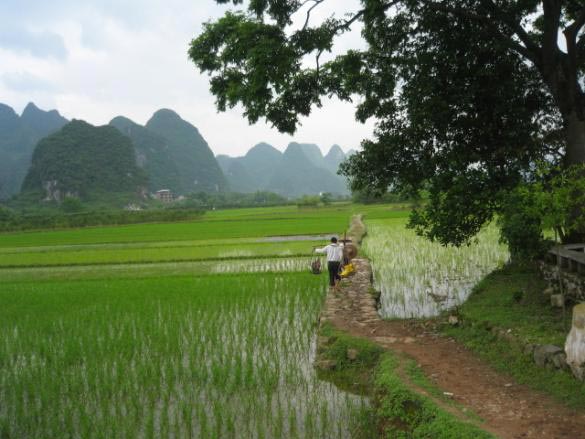

Fortunately, we had arrived in Yangshuo, the premier
attraction in the Hunan province
of Southern China, located one hour
southeast of Guilin
by bus. Throughout history, poets have crafted lyrics over its mystical beauty
and artists have rendered the landscape into unique and characteristic Chinese
scroll ink paintings. With hundreds of saw-toothed limestone pinnacles haphazardly
poking up through the colorful terrain, this area of China will surely delight and
inspire your imagination.
Yangshuo is tourist friendly, with English widely spoken and
plenty of affordable accommodations and restaurants along the pedestrian road Xi
Jie, commonly identified as ‘Foreigner
Street’. It’s easy to find a comfortable place to
stay, with most of the guesthouses offering the same basic look. We found the
perfect guesthouse at a great rate with a balcony overlooking the street, only to
return home after dinner to find rats on the stairwell. Yech! Needless to say,
we moved to our second choice, the lovely Rosewood Inn, where we ended up
staying for ten days.
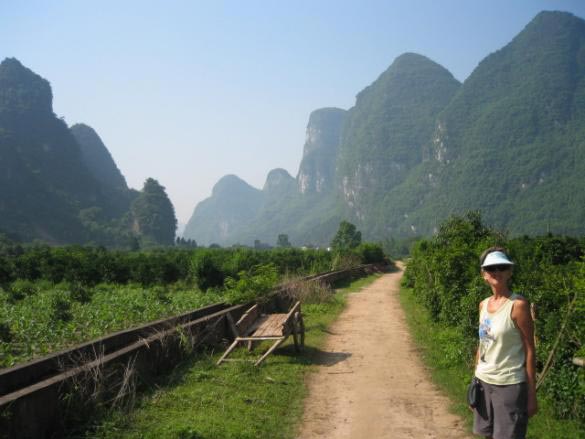
 Yangdi to Xingping Hike
Yangdi to Xingping Hike
One of the premiere activities is the spectacular 14-mile day long hike along the Li River that connects the towns of Yangdi and Xingping.
Cram into the miniature bus at the main bus station for the one-hour trip to
Yangdi, pay a modest entrance fee of $2.00, hop on the ferry that crosses
the river, and enjoy the path as it winds through the countryside. Wander by habitats
and refreshment stands, where crooked old grandmas sell oranges and bags of peanuts
and merchants barter polished river rocks, while villagers shout out offers of
rides on homemade bamboo rafts.
As we strolled along the Li River, I surveyed the limestone
crags and struggled to match the names on the map with the appropriate rock
face. The mysterious ‘Eight Super Naturals Crossing the River’, the humorous
‘Tortoise Climbing Up the Hill’, the obvious ‘Fish Tail Peak’, the evocative
‘Nine Horse Fresco Hill’ and my favorite, the imaginative ‘Grandpa Watching
Apple’. The inventive surroundings transformed me into another world, where I
expected at any time to stumble across Frodo and the fairy tale, The Hobbit, as they
waddled out of the Middle Kingdom to greet us on the well-worn path.
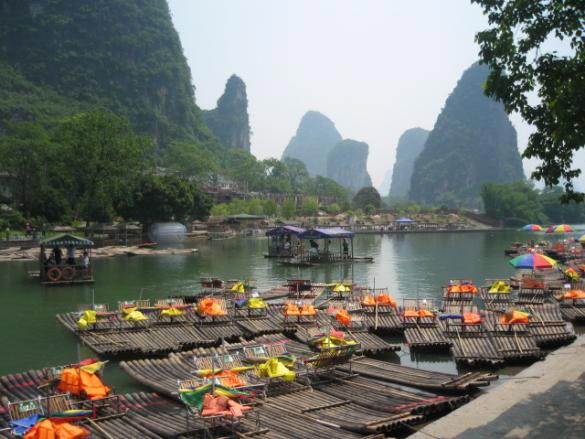
 Bamboo Rafts on Yulong River, Yangshuo
Bamboo Rafts on Yulong River, Yangshuo
There are many bike routes outside of town, with every hotel
and guesthouse renting bicycles for a couple of bucks. One day, we embarked on the
highly recommended 20-mile bike loop up the Yulong
River to Dragon Bridge.
We pedaled along paths muddied by recent rain, through neighborhoods colored with
bright red lanterns snapping in the wind, past immaculate, well-tended gardens,
and ponds teeming with plump catfish gulping for air.
Farmers twisted homemade cigarettes and patiently waited in
line with their leaky burlap bags of rice, as the merchant muscled the sacks unto
rusty old scales, rebalanced the iron weights, and penciled in the amount. Nee how, nee how, (Hello) we echoed to
people on the path, balancing along the narrow causeways that separated the
patchwork of paddies. Everywhere, vegetation draped peaks punctuated the
horizon like a saw-toothed dragon asleep beneath the surface.
Along the Li River, shorter bike routes led to the community
of Fuli, famous for its handcrafted fans that decorate the many workshops. We cycled
past hunched over farmers standing knee deep in muddy squares, the brilliant
sun baking the atmosphere into a sweaty mugginess. Sluggish, dirt spattered
water buffalo grunted along the trails as a comforting earthiness flavored the
air. Stumped at a questionable fork in the trail, we leaned our bikes and rested
in the shade. Soon a local arrived and we pointed down both paths, shrugged,
and asked “Fuli?”
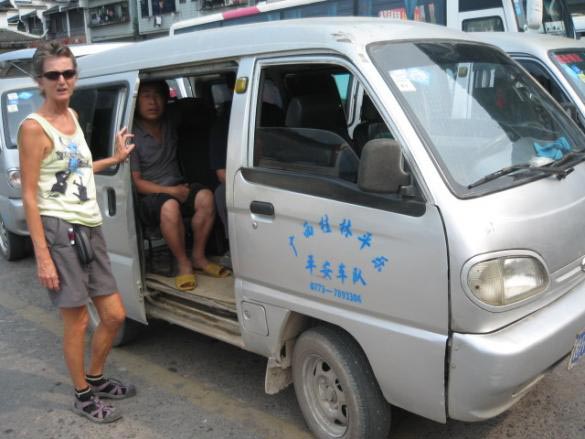
 Local Bus in Yangshuo
Local Bus in Yangshuo
Getting around the countryside is easy; just arrive at the busy
bus station located in central Yangshuo, locate the sign for your destination,
and squeeze on with the other passengers. Many of the routes leave at regularly
scheduled times, while others may not depart until they have a full load. We
jumped on a bus to Yueliang Shan (Moon Hill) for a couple of hours one day,
where we scrambled to the top for spectacular views of the surrounding mountains.
During the day, Yangshuo swarms with day-trippers from Guilin, five hours
downriver. Arriving on the cavalcade of boats around noon, the tourists poke
around town and leave by bus in early evening. One after another, the vessels
churn up the river accompanied by a constant blaring from cheap speakers, as the
tour guide points out rock formations along the way. Merchants line the
walkways into town and offer cheap souvenirs as they disembark at the dock.
Food choices range from dumplings to pizza. When dining,
brazenly choose from the local menu, point to something that looks interesting
at an adjoining table, or safely choose rice and noodles – it’s all an
adventure and a riotous one at that. Our favorite was the affordably priced ‘Noodle
Bar’, easily identified by the overflowing tables set in front, with huge
portions of Chinese favorites served at a hectic yet organized pace. Curiously,
bands of police patrolled the streets one day and forced all restaurants and
vendors to move their displays and tables indoors – they felt they were
blocking the walkways. The next day, the police disappeared and the tables and
displays quickly returned to their original locations.
Some of the coolest souvenirs are stone-carved stamps, where
your last name is converted into Chinese characters and engraved into the rock.
Quite a few shops in town offer this service, although we’d recommend going to
the best – Huang Guan Hua Stone Engraving – where a master calligrapher will
produce a memorable rendering of your name on a unique piece of stone for
about $15. Around town, you’ll find innumerable Chairman Mao paraphernalia – posters,
playing cards, clocks, and bags stamped with his image – still a popular and
respected figure in Chinese history. Or, stock up on the latest DVDs, purchased
from one of the many shadowy entrepreneurs who maintain their inventory in a
daypack, and nervously glance about for local police.
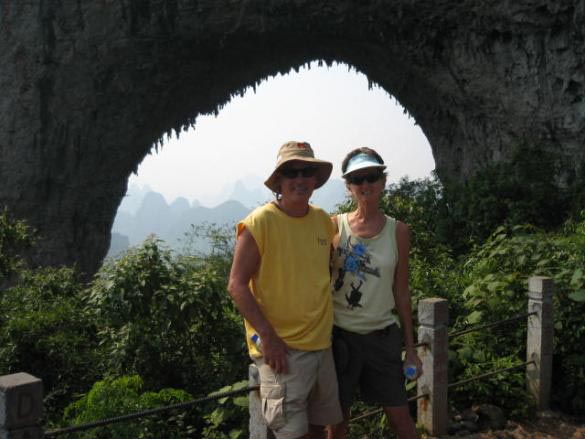
 Author and Wife at Moon Hill,
Yangshuo
Author and Wife at Moon Hill,
Yangshuo
Getting to Yangshuo is easy; leaving is difficult. We both
loved it
and would have gladly stayed another week. To fully appreciate this
intriguing area, plan to spend more than a day. Wander into the
countryside, which is truly representative of rural China. After ten days, it was time to move on to other parts of China. I would be quick to
return, and I enthusiastically give Yangshuo our highest recommendation.
Having had such wonderful experiences in Yangshuo, one of my
favorite U2 songs comes to mind – “Stay, Faraway, So Close.” So many memorable scenes
and impressions will remain with us fondly. Long after we leave, though
faraway, Yangshuo will remain close in our hearts and minds for years to come, bringing a warm smile to our faces.